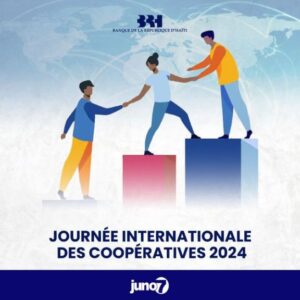In three months, the initial one-year period of the Multinational Security Support Mission (MMSA) in Haiti authorized by the United Nations Security Council will end.
The Security Council had authorized in October 2023 the deployment of a multinational security support mission, led by Kenya, in close cooperation and coordination with the Haitian government, for an initial period of 12 months, with a review after nine months.
The planned nine (9) months have passed. The United Nations Security Council under the Presidency of the Russian Federation for the month of July, held a meeting to take stock and draw conclusions.
Here is the report presented following this meeting of July 3
MARÍA ISABEL SALVADOR, Special Representative of the Secretary-General and Head of the United Nations Integrated Office in Haiti (BINUH), welcomed recent developments in that country towards the restoration of democracy, including the installation of the Transitional Presidential Council in April and the appointment of an interim Prime Minister and a new Government sworn in in June. These were “clear indications of progress,” she said, noting that Garry Conille had been chosen as interim Prime Minister by the Transitional Presidential Council. The new Transitional Government was composed of 14 ministers heading 18 ministries. With the installation of that Government, the two-headed executive had committed to leading Haiti towards the restoration of State institutions through the holding of credible, inclusive and participatory elections that would lead — according to the proposed timetable — to the installation of elected authorities by February 2026 at the latest. BINUH is reorienting and redefining its priorities to support this Haitian-led and Haitian-owned transition, she said, proposing to consider the possibility of strengthening BINUH’s electoral expertise.
She welcomed efforts to increase women’s participation in the country’s transition, noting that six ministries are overseen by women, representing 33 percent of all ministries, and that 50 percent of the heads of Haiti’s diplomatic missions are now women. “Inclusion and diversity are essential to promote a political transition that paves the way for the restoration of State institutions and effectively responds to the needs and expectations of all Haitians,” she stressed. Systematically increasing the participation of women and youth in this process is a fundamental pillar of BINUH’s renewed strategy to support the political process. The Office also supported the organization of the Civil Society Forum on 27 and 28 June in Port-au-Prince and hopes that the Forum will establish a platform for continued dialogue between civil society and community leaders, women’s and youth groups, and transitional governance structures. BINUH will provide strategic and logistical support to this key platform, she added.
The second pillar of the Office’s strategy is to promote human rights at all levels of Haitian society, she said, noting that the BINUH human rights section recently supported the training of 61 magistrates from Port-au-Prince and Croix des Bouquets on investigative techniques in sexual violence. On the security front, she said that construction of the base that will house the multinational security support mission – approved by Security Council resolution 2699 (2023) – has been completed and a first group of Kenyan police officers arrived on 25 June for deployment. She also welcomed the recent appointment of a new Director General of the Haitian National Police, as it “brings new hope in the ongoing fight against gang violence.”
Going forward, she said, establishing a coordination mechanism between national authorities, the multinational security support mission, the United Nations and other partners in Haiti would be essential to promote complementarities, exchange information and design effective communication strategies. Resolution 2692 (2023) had authorized the strengthening of the police component in BINUH, but the financial situation of the United Nations and the freeze on recruitment had prevented the Office from making progress in strengthening the police and the corrections sector. Resolution 2699 (2023) mandated the multinational security support mission to establish a human rights monitoring mechanism. As that mission expanded, it was also essential to strengthen the human rights area in BINUH in order to provide the necessary support, she said. Finally, she invited the Council to visit Haiti if and when appropriate.
Statements
The United States Representative said the crisis in Haiti remained severe, with nearly 5 million people facing severe food insecurity. Food, water and medicine were often in short supply, and States must increase humanitarian assistance to those in need. Across the country, gangs had committed horrific atrocities, including murder, mass rape, kidnapping, forced recruitment, exploitation and trafficking of children. Coordinated gang attacks had driven tens of thousands of residents from their homes. For its part, Washington, DC, intended to provide $309 million to the multinational security support mission, she said, declaring: “Our support for the Haitian people is unwavering.” She further stressed the need to promote accountability for past atrocities, adding that the Council should consider sanctions against individuals and entities responsible for actions that threaten peace and security in Haiti. Regarding the illicit flow of arms to Haiti, she highlighted her country’s efforts to enforce the arms embargo.
The representative of Ecuadorhighlighting Haiti’s “historic contribution to the freedom of Latin America and the Caribbean,” said it was time to live up to that legacy. Welcoming the appointment of the Transitional Presidential Council, the Prime Minister and the Cabinet, he said the establishment of a provisional electoral council was the next step, leading to the holding of free, transparent and fair elections in February 2026. The multinational security support mission must be adequately supported, he said, calling for the strengthening of the Trust Fund. Implementing the mission’s mandate and strengthening the Haitian National Police required a coordination mechanism that included Haitian authorities, the mission and the United Nations. Also noting the high levels of food insecurity and systematic human rights violations by gangs, he stressed that the justice and corrections systems must be able to hold perpetrators to account. Calling on Council members to prevent the sale, supply and transfer of arms to unauthorized actors in that country, he said Haiti represents an “existential test” for the Council.
The representative of Francewelcoming the arrival of the first Kenyan police officers, noted that this is the first step in the deployment of the multinational security support mission in Haiti. For its part, France has contributed €3 million to the relevant United Nations trust fund, as well as €850,000 to the International Organisation of La Francophonie (OIF) to provide language training to those deployed. Stressing the importance of the mission in assisting the Haitian National Police – “which has been under immense pressure in recent months” – she said the police are essential to creating conditions conducive to elections. She also stressed the need to restore democratic institutions – “without which there can be no stability in Haiti”. Thus, the new Government must develop a road map for the organization of elections in accordance with the agreement reached in Kingston, and the Council “must continue to accompany Haiti on the path to stability” by renewing the mandate of BINUH and adding to the relevant sanctions list those who support the gangs.
The representative of Guyana, speaking also on behalf of Algeria, Mozambique and Sierra Leone, commended the continued support provided to Haiti by BINUH and relevant United Nations agencies, often under difficult conditions. She also acknowledged the contributions of the Caribbean Community (CARICOM) and the support of other regional and international partners to the stability of the country. The Secretary-General’s latest report recorded 3,252 intentional killings from January to May 2024. In this regard, she welcomed the arrival of the first contingent of Kenyan police officers in Port-au-Prince as part of the Multinational Security Support Mission. She called for scaling up concrete support, including through financial contributions to the Multinational Security Support Mission Trust Fund.
“In recent months, we have witnessed the courageous efforts of the Haitian National Police to secure critical infrastructure,” she said, expressing regret at the killing of more than 20 police officers by gangs since January. The Council “must also do its part,” she stressed, adding: “We look forward to expanding the sanctions regime and considering other appropriate measures.” Preventing the illegal flow of arms and ammunition to Haiti is essential to stabilizing the security situation. Member States must continue to support measures to combat flows that enable criminal activity. Haiti has paid a high price for its independence and paved the way for the independence of so many others in this hemisphere and beyond. “While the future of the country is in their hands, we, the international community, have an important role to play in supporting their inherent right to live in peace and dignity,” she stressed.
The representative of the United Kingdom stressed that “the multifaceted crisis in Haiti has impacted the lives of Haitians for far too long.” Schools are closed, hospitals are short of supplies, and access to food is severely limited. “We continue to hear frightening accounts of gangs using sexual and gender-based violence as a means of controlling the population,” she said, welcoming the recent arrival of members of the Multinational Security Support Mission in Haiti, which remains vital in supporting Haitian efforts to address the instability. The United Kingdom has pledged more than $6 million to the mission. She urged Haitian political and civil society – including with the active participation of women and youth – to seize this opportunity to address the root causes of the security crisis and create the conditions necessary to bring about lasting change. In addition, she highlighted the important role of BINUH in supporting the transitional government, noting that this should be coordinated with the Multinational Security Support Mission.
The representative of the Republic of Korea said Haiti still suffers from endemic gang violence that prevents its population from accessing essential supplies, including health care, food and water, n a context of unprecedented hunger and displacement. With the increase in killings and kidnappings by armed gangs, the lives of civilians are at significant risk. In addition, gender-based violence has become part of the tactics of armed gangs to sow fear in communities. Despite these persistent security challenges, there have been “visible signs of hope,” he said, highlighting the arrival of 200 Kenyan police officers in Port-au-Prince. The multinational security support mission will provide critical support to the Haitian National Police in the fight against gangs, help strengthen security around critical infrastructure, and ensure the delivery of humanitarian assistance. He further stressed the need to strengthen BINUH’s critical role in supporting free and fair elections, protecting human rights, and providing advisory support to the Haitian National Police.
The representative of the Russian FederationPresident of the Council for the month of July, speaking in his national capacity, said that the transitional authorities must prioritize the holding of elections, the restoration of order and the establishment of interim administrative bodies. “Any external interference in these processes is unacceptable,” he stressed. Noting that armed groups continue to control the capital’s main entry and exit points as well as important transportation facilities, he underlined that the main arms smuggling route runs from Florida to Haiti. The current embargo does not prevent the flow of weapons from the United States, he said, also noting that the Security Council Committee established pursuant to resolution 2653 (2022) refrains from using sanctions to address this problem. Its current list includes five individuals who are leaders of criminal gangs; however, the activities of the criminal underworld represent only a small part of the problem. Furthermore, the gangs do not have property or assets abroad and do not travel abroad, unlike American arms dealers, he stressed. The multinational security support mission must work in close coordination with national security forces. “We were promised not to repeat the mistakes of the past,” he said, stressing that the mission’s activities and public perception will be closely monitored.
GARRY CONILLE, Prime Minister Acting Prime Minister of Haiti, affirming that the people of his country “continue to fight for a better future,” stressed the “urgent need to find a lasting solution to the security challenges exacerbated by the activities of criminal gangs.” He also called for effective cooperation between national authorities, the Multinational Security Support Mission and BINUH to help restore security and restore democratic institutions – “which are strategic for the transition.” Calling for solidarity to help Haiti emerge from the crises that have ravaged it for several decades, he stressed: “Every day must be used wisely.” In this regard, he indicated that since his appointment as interim Prime Minister, he has held several working sessions involving the Transitional Presidential Council, anti-corruption and accountability institutions, law enforcement, the private sector and diaspora associations. More than ever, Haiti must mobilize all available resources necessary “to make this transition the last,” he stressed.
Noting that Haiti is at a “critical point” – with 12,000 armed individuals holding a population of 12 million hostage – he said: “At this critical juncture, no project, whether economic or political, can be addressed without addressing the issue of security.” He therefore welcomed the implementation of the commitments made in resolution 2699 (2023), saying that the deployment of the first contingent of police officers from the multinational security support mission alongside Haitian law enforcement should help put an end to the activities of criminal groups. “But Haiti must once and for all break out of the spiral of security missions,” he insisted, calling for a redefined approach so that, at the end of the mission, Haiti has strong and effective institutions. To this end, the Government will adopt a holistic and community-based approach to security – the former because economic recovery and access to basic social services must go hand in hand, the latter because public confidence in the police must be restored.
He also detailed the government’s goal of establishing adequate infrastructure that meets modern construction standards, reorganizing some cities, restoring basic social services, and creating employment opportunities. “This is the only way to restore lasting peace and security in Haiti,” he said. “There is no Haitian fatality,” he added, saying that the current situation is the result of a policy that separates the state and the people. Thus, to do things differently, the government will facilitate elections and constitutional reform, strengthen mechanisms to combat corruption and impunity, develop security strategies focused on interaction between the population and the police, and modernize the judicial system. Stressing that as new international security forces arrive, the international community must remember that Haiti’s history of foreign intervention “has been a mixed bag,” he called for mechanisms to be put in place to ensure not only security, but also dignity and respect, “to ensure that the mistakes of the past are not repeated.”
Read the full report: https://reliefweb.int/report/haiti/security-council-question-concerning-haiti
Similar articles






